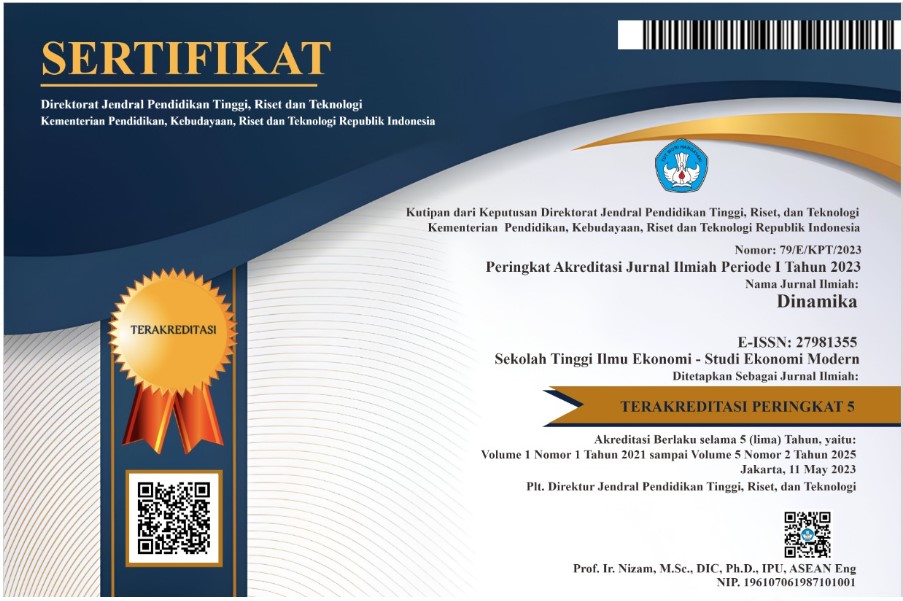PENGARUH PENJUALAN MINYAK ECERAN DALAM HUBUNGAN PELANGGAN TERHADAP PEMBENTUKAN EKUITAS MEREK SERTA DAMPAK LOYALITAS KONSUMEN DI DKI JAKARTA
DOI:
https://doi.org/10.51903/dinamika.v3i2.402Keywords:
pengaruh, penjualan, minyak eceran, ekuitas, merek, loyalitas, konsumen.Abstract
This research aims to analyze the influence of retail oil sales in customer relationships on the formation of brand equity and the impact of consumer loyalty in DKI JAKARTA. The population is all groups who use retail oil products in Jakarta, then the sample used was selected using a purposive random sampling quota method of up to 250 people. The type of research used in this study is descriptive research using a set of scientific methods and procedures to design and collect data that describes the characteristics of objects, events or situations. This analysis aims to understand the influence of retail oil sales in Jakarta on customer relationships, the formation of brand equity, and the impact of consumer loyalty. The results of the analysis mean that on the customer relationship variable, the three indicator items are declared valid, but one indicator is declared invalid. Therefore, in the customer relationship variable, you can not use invalid indicators. The brand equity variable is declared valid on all four indicators. and the consumer loyalty variable is declared valid on all four indicators. In the reliability test, there are four variables that are declared reliable in the theory of Muniarti et al. and apart from that, testing with descriptive analysis and hypotheses. It is hoped that the results of this study will be able to provide advice and information to retail oil sellers so that they can reach a wider range of consumers and target them appropriately.
References
[2] X. Y. Chew, R. Alharbi, K. W. Khaw, and A. Alnoor, “How information technology influences organizational communication: the mediating role of organizational structure,” PSU Res. Rev., 2023, doi: 10.1108/PRR-08-2021-0041.
[3] S. E. Pogodayev, “Marketing of works as a source of the new hybrid offerings in widened marketing of goods , works and services,” J. Bus. Ind. Mark., vol. 28, no. 8, 2013, doi: 10.1108/JBIM-04-2012-0069.
[4] E. Gummesson, R. F. Lusch, and S. L. Vargo, “Transitioning from service management to service-dominant logic: Observations and recommendations,” Int. J. Qual. Serv. Sci., vol. 2, no. 1, pp. 8–22, 2010, doi: 10.1108/17566691011026577.
[5] R. C. Hoffman, J. F. Kincaid, J. F. Preble, J. F. Kincaid, W. Salem, and J. F. Preble, “International Franchise Expansion : Does Market Propinquity Matter ?,” Multinatl. Bus. Rev., vol. 16, no. 4, 2012.
[6] Angelita Nauli Panggabean, “Customer relationship management,” 2020.
[7] K. Kurniawati and K. I. Tjiptodjojo, “LOYALITAS PELANGGAN ( STUDI PADA PELANGGAN MANFAAT ATRIBUT PRODUK SIMPATI ),” J. Manaj., vol. 14, no. 2, pp. 165–174, 2015.
[8] M. Rachmawati, S. N. Priatna, and W. Kurniadi, “The Performance Of Retailing Mix And Customer Relationship Management For Increasing Customer Value And Corporate Image Of PT . Hanan Boga Rasa Cathering , Snack And Bakery Turkish Journal of Computer and Mathematics Education Research Article,” vol. 12, no. 8, pp. 292–298, 2021.












